Menopause marks the beginning of a new chapter in a woman’s life, which challenges and changes the status quo in a myriad of ways. Among the most distressing among these life changes, for many women, is the menopause and libido loss duality that can leave you feeling “broken”. If you’re struggling with a low sex drive after menopause, know that you’re not alone and there is definitely nothing wrong with you.
Also, just because something has changed in your body doesn’t mean you’re doomed to live with it. There are means and ways to manage, combat, and cope with loss of libido during menopause. In the exhaustive guide on the connection between menopause and loss of sexual desire, we cover all of that and more to help you navigate intimacy in this new phase of life.
Understanding The Correlation Between Menopause And Libido Loss
Table of Contents
Changes in your sex drive and desire during and after menopause are usually due to a combination of biological factors and psychological factors working together. Understanding these causes can reassure you that there are real, normal reasons for what you’re feeling and that solutions exist. Here’s what might be behind a lower or no sex drive during menopause:
Biological causes
The changes in your body during this phase impact pretty much everything, from your bone health to hair and skin quality and emotional well-being. Your sexual health and desire are no exceptions. If you’re experiencing low sex drive after menopause, it could be because of one or a combination of the following changes:

1. Hormonal changes: low estrogen, low sex drive
The menopausal transition is marked by a steep drop in estrogen. Low estrogen, low sex drive is a very real cause and effect. Estrogen plays a key role in sexual arousal. As levels fall, you might notice that your desire isn’t as strong as before. Lower estrogen also means reduced blood flow to the vagina and clitoris, leading to thinner vaginal tissues and less natural lubrication. These changes can make arousal more difficult and orgasms harder to reach. All of this ultimately translates to the simple fact that your body isn’t “igniting” as easily because the hormonal fuel is lower than it used to be.
Related Reading: 5 Ways Exercise And Fitness Improve Your Sex Drive
2. Vaginal dryness and pain
Physical symptoms of menopause can create a vicious cycle with libido. Thinning vaginal walls and dryness, a condition known as genitourinary syndrome of menopause, or GSM, often lead to painful intercourse or dyspareunia, for about half of postmenopausal women. When sex hurts, it’s natural for your desire to nosedive, and your body starts associating intimacy with discomfort. Even if you mentally want to be close, you might find yourself subconsciously avoiding sex to avoid pain. This is a very real biological response. Over time, fear of pain can further suppress arousal.
3. Other physical factors
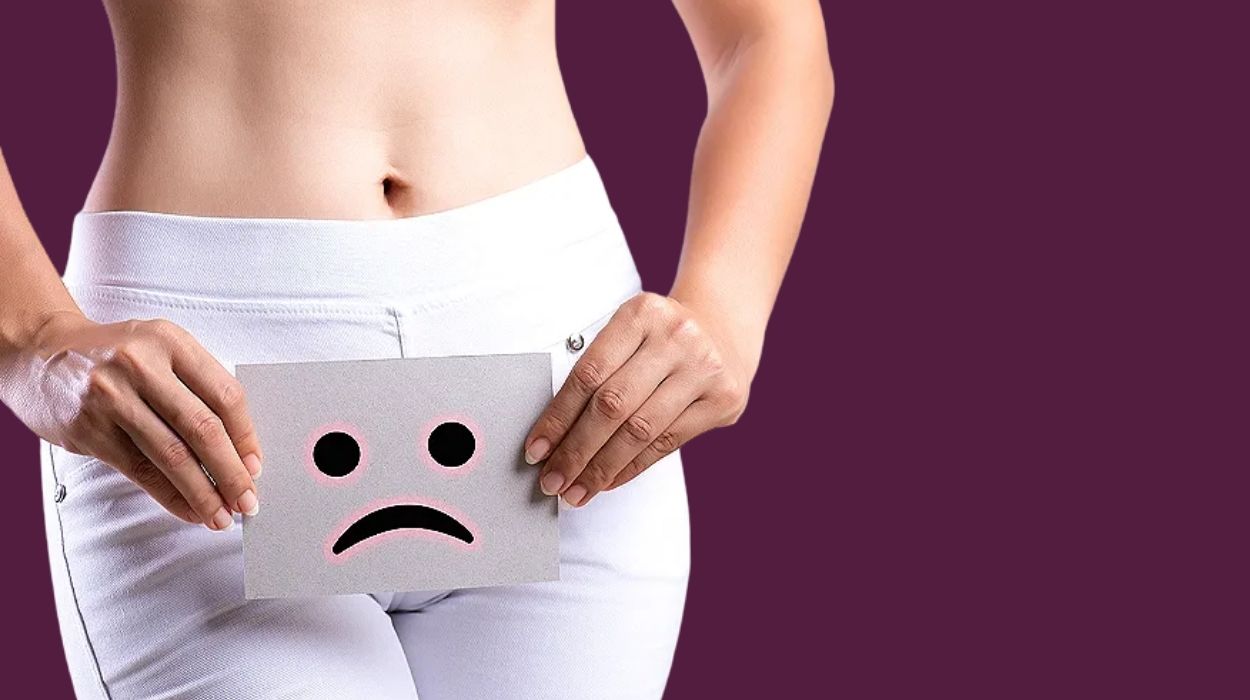
Menopause often comes at a stage of life when other health issues or lifestyle factors can interfere with libido, too. Sleep disturbances from night sweats and hot flashes can leave you exhausted with no energy for sex. Weight changes or midlife aches, like joint pain, might make sex positions uncomfortable.
If you’re on medications, for example, certain antidepressants or blood pressure drugs, those can dampen your sex drive as a side effect. An underlying medical condition, such as diabetes or thyroid issues, can also reduce sexual responsiveness. Since menopause often coincides with other physical hurdles, all of these factors can collectively pump the brakes on your libido.
Related Reading: Maintenance Sex – What Is It, Why Is It Important, And How To Have It?
Psychological causes
The correlation between menopause and lack of desire isn’t purely physiological. There are psychological factors at play as well. These include:
1. Stress and mood changes
Apart from the biological changes, menopause also proves to be an emotional roller coaster. Fluctuating hormones can lead to mood swings, anxiety, or even depression, all of which diminish sexual desire. On top of that, midlife stresses like caring for aging parents, children leaving home, or career shifts, weigh heavily on your mind.
“Women often have trouble turning off the to-do lists running through their heads,” notes psychologist Dr. Lori Brotto, explaining how chronic stress triggers hormonal reactions that blunt desire. If you’re constantly anxious or overwhelmed, your brain may simply not switch into “sexual mode” easily. Over time, stress can essentially put out the flame of desire, placing sex low on the priority list.
Related Reading: Miserable Husband Syndrome – Top Signs And Tips To Cope
2. Body image and self-esteem
The physical changes brought on by menopause—weight gain, body shape changes, or hair thinning—can alter how you feel about yourself and leave you grappling with low self-esteem. It’s hard to feel sexy when you’re self-conscious. Many women report feeling “less feminine” or undesirable, which in turn saps libido. Your own beliefs play a big role: if you think of menopause as the end of your sexy years, your brain might internalize that.
Negative self-talk about aging can become a self-fulfilling prophecy for low desire. On the flip side, women who embrace body changes and find new ways to feel confident often see their desire improve. Sex therapist Dr. Laurie Mintz says, “We think we’re supposed to feel like we did when we were 20 instead of accepting that what turns you on at 50 may be different.”
Not a thing will get my desire back. I love my husband. He’s patient & loving and good at all the things but I’d just rather sleep. Put the hottest celebrity crush I have in front of me and not even that would work.
And..I’m not atrophied or dried out.
I hate it because I want my sex drive back.
—a Reddit user
3. Relationship and life factors
Desire doesn’t exist in a vacuum. It often reflects what’s happening in your relationship and environment. If you’re experiencing conflict with your partner or a lack of emotional connection, your interest in sex can dwindle. Menopausal couples sometimes misinterpret each other. For instance, you might avoid sex due to pain or fatigue, and your partner might feel you’re no longer attracted to them. This tension can further dampen libido.
Additionally, situational factors like a recent loss, retirement adjustments, or even something as simple as having less privacy at home can all affect your mood for sex. Even mundane factors can sneak in. A sink full of dirty dishes or feeling overwhelmed by mess can be a turn-off when you’re already on edge.
Menopause And Lack Of Desire: The Impact On Relationships And Emotional Well-Being
Sex is an important way for couples to connect. When that connection frays, it’s common for both partners to feel confused or hurt. The ripples of a loss of libido during menopause are surely felt in your relationship as well, and go on to impact your emotional well-being. Here’s how:
Strain on intimacy and communication
It’s no surprise that a significant loss of sexual desire can create frustration or distance in a relationship. You or your partner might worry, “Is it me? Did I do something wrong? Will our sex life ever come back?” These doubts can chip away at self-esteem and closeness. Studies show nearly 50% of postmenopausal women experience a decline in sexual desire due to the hormonal and emotional changes of menopause.
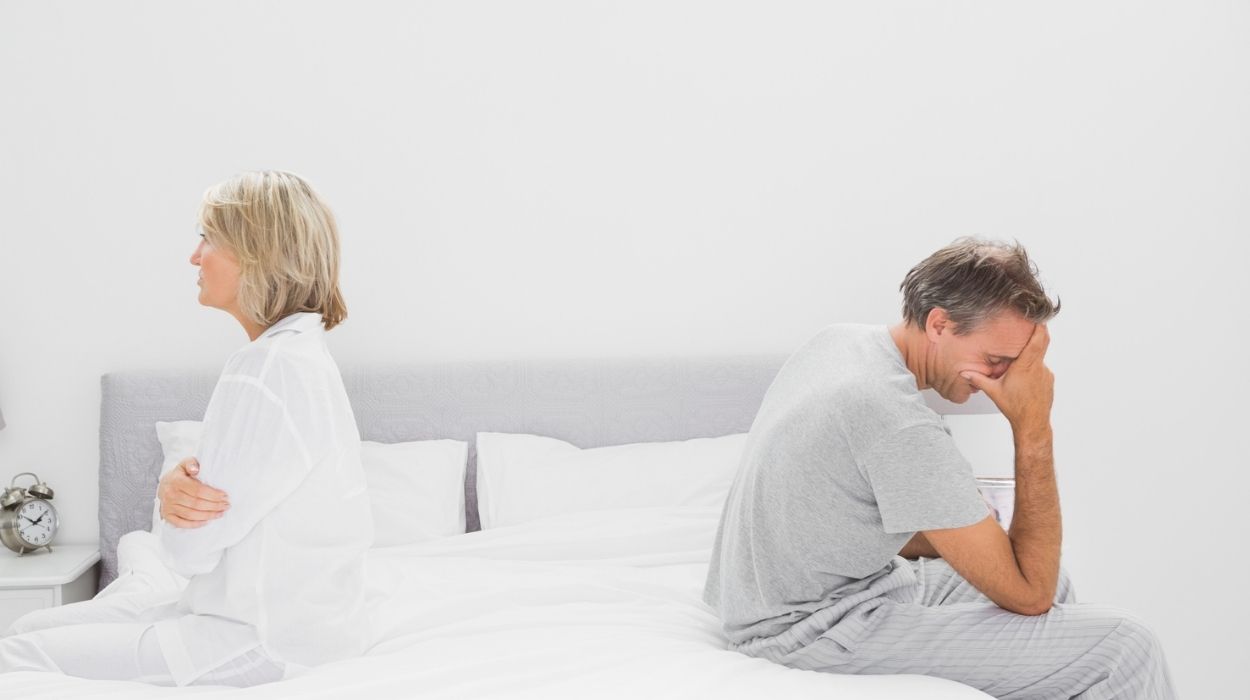
That’s a lot of couples potentially struggling with mismatched libidos or sexless marriages. This situation can lead to miscommunication and even depression for both partners if they feel intimacy is slipping away. When physical affection wanes, partners might unintentionally start avoiding the topic or each other to prevent awkwardness. This silence breeds misunderstanding.
Sex therapists and couples counselors emphasize that honest, compassionate conversation is key to avoiding resentment. If you acknowledge the change together, you can reframe it as “our challenge” rather than one person’s fault. When both partners understand that libido loss is a natural part of menopause for many women, they can approach it as a team problem to solve, rather than a personal rejection.
Related Reading: How To Deal With Sexual Rejection From Your Partner – 9 Tips
Emotional toll and self-image
For the woman experiencing it, low libido can take a toll on mental health. You might feel guilty for not desiring your partner, or worry that you’re letting them down. One woman on Reddit described feeling “utterly defeated and spiraling into shame due to low sex drive after menopause. She says,
I have struggled with low libido my entire life as I was sexually abused as a child for an extended time. I have as spent close to 20 years in therapy working through things and have made huge progress, but the elephant in the room has always been sex. Fast forward to now, and I want to have a healthy sex life, but my libido is absolutely gone. I literally feel no arousal at all…
I have been happily married for 25 years, but feel like such a failure in being intimate with my husband. Every night when we go to bed, I feel an immense amount of shame knowing that it’s because of me that we’re not intimate.
This kind of personal anguish is more common than you’d think, and can be compounded by loss of libido, fueling lows in one’s mood. A lack of desire might lead to less sex, less sex can reduce the release of feel-good hormones and physical intimacy that boost mood, and that in turn can make you feel more down or disconnected.
Over time, some women begin to question if something is “wrong” with them. Dr. Brotto reiterates, “Low sexual desire does not mean something is wrong with you.” It’s normal, especially at midlife. Reminding yourself of this can ease some of the self-blame and pressure.
Tips for Managing Libido Loss After Menopause
While menopause and loss of sexual desire are natural, you don’t have to simply accept a low libido if it’s bothering you. There are several ways you can manage and potentially improve your sexual desire and satisfaction. We bring you some time-tested strategies you can adopt, ranging from lifestyle adjustments to mental shifts to bedroom techniques. Consider these tips as a toolkit. You can mix and match what resonates with you. Remember, it’s about finding what works for your body and mind.
1. Prioritize your overall health and energy

It’s amazing how much our general wellness affects sexual desire. Think of libido as a reflection of your body’s overall balance. When you feel good, rested, and vibrant, your sex drive has a better environment to resurface. If you are struggling with low sex drive after menopause, going back to the basics of physical wellness might help. Here are some things you can try:
- Stay physically active: Regular physical activity improves blood circulation, including to sexual organs, boosts mood via endorphins, and helps reduce stress, all of which work in tandem to boost libido. Even a daily brisk walk or yoga session can make a difference in how you feel about intimacy. So, sign up for that spin class or go on that nature hike. It might literally put the pep back in your step and your sex life
- Get quality sleep: Menopausal symptoms like night sweats can wreck your rest, and that deplete libido faster than you can imagine. Do what you can to improve your sleep hygiene. A cool, dark room, perhaps a fan or cooling pillow for hot flashes, and avoiding screens or heavy meals before bed. When you’re well-rested, your hormones, including those related to stress and arousal, are more regulated. If insomnia or sleep disturbances are severe, talk to your doctor for solutions. Sometimes treating sleep issues with meditation, supplements, or HRT restores enough energy that interest in sex perks up naturally
- Eat nutrient-dense foods and stay hydrated: There’s no magic “libido diet,” but fueling your body with balanced nutrition can indirectly benefit sexual health. Aim for plenty of fruits, vegetables, lean protein, and whole grains to keep your blood sugar stable and mood even. Some women find that including phytoestrogen-rich foods like soy, flaxseed, or legumes or foods high in omega-3s like fish and walnuts helps them feel better hormonally. And don’t forget to drink enough water. Dehydration can cause fatigue and vaginal dryness, neither of which help in the bedroom!
- Moderate alcohol intake and avoid smoking: While a glass of wine might relax you in the moment, too much alcohol can actually blunt arousal and make you sleepy as well as interfere with vaginal lubrication. Try to keep alcohol in moderation and see if you notice improvement in your sexual responsiveness. Smoking is notorious for reducing blood flow and has been linked to decreased sexual arousal in women, on top of all its other health harms. Quitting smoking or vaping can improve circulation and estrogen levels, giving your libido a lift
- Manage chronic conditions: If you have other health issues like diabetes, hypertension, or thyroid disorders, keeping them well-managed will help your sexual function. For example, uncontrolled diabetes can damage blood vessels and nerves involved in arousal. Taking medications as prescribed and following medical advice to control such conditions can prevent them from contributing to libido problems. In some cases, treating an underlying issue like an underactive thyroid or an iron deficiency might noticeably improve your energy and interest in sex. So, be sure to keep up with your regular check-ups
The bottom line is, the healthier and more energetic you feel, the more likely your sexual desire will get a chance to shine through. Self-care isn’t selfish, it’s a foundation for rekindling intimacy.
Related Reading: Our Marriage wasn’t Loveless, Just Sexless
2. Address emotional and psychological factors
Libido resides as much between the ears as between the legs. Tending to your mental and emotional well-being is crucial. This can involve reframing how you think about sex, reducing anxiety, and actively nurturing emotional intimacy with your partner. Here are some approaches:

- Open communication with your partner: Talking to your partner openly about what you’re going through is one of the best things you can do when struggling with menopause and loss of sexual desire. It might be awkward at first, but honest, open communication prevents misunderstandings like “She’s not interested in me anymore.” Explain that your lack of desire is not about their attractiveness or your love for them, but a menopause-related change. A good partner will want to understand and help. Together, you can brainstorm alternatives for intimacy, such as more cuddling, kissing, non-sexual touches, or explore interventions like using lubricants or scheduling sex
- Rediscover non-sexual intimacy: Remember that intimacy is a spectrum, it doesn’t always have to involve intercourse. Reconnecting in non-sexual ways can actually lay the groundwork for rekindling desire. Spend quality time together without the pressure of sex. Hold hands during a walk, snuggle while watching a show, give each other back rubs or foot massages. These forms of physical touch release oxytocin, the bonding hormone, which can reduce stress and increase feelings of connection
- Mindfulness and stress reduction: It’s hard to feel sexual if your mind is constantly racing or anxious. Practicing mindfulness can help break the cycle of distracted or negative thoughts that kill arousal. “Our research over the last 15 years has shown that mindfulness practices are one of the most effective ways for women to manage stress, and positively improve sexual desire and arousal,” says Dr. Brotto, a psychologist and sexual health expert. Mindfulness can be as simple as learning to focus on physical sensations without judgment, through exercises like deep breathing, guided body scans, or even mindful touching exercises with your partner. When you’re in the act, if your mind wanders to grocery lists or work stress, gently bring your attention back to the sensations you feel and the enjoyment of the moment. Many women find that over time, this greatly enhances their ability to become aroused
- Challenge negative beliefs: Sometimes our own beliefs about sex and aging turn into mental roadblocks. If you catch yourself thinking, “I’m too old for sex” or “I’m just not a sexual person anymore,” question that narrative. It’s true that your sexuality at 50 or 60 might not look like it did at 25, and that’s okay. You’re in a new chapter, but it can still be a rich one. Reframe sex as something that can be fun and worth prioritizing at this stage of life
- Consider counseling or sex therapy: If the emotional strain or relationship issues feel too complex to tackle on your own, don’t hesitate to seek professional help. A therapist trained to guide you through these conversations and strategies can help identify specific issues like performance anxiety, body image concerns, or unresolved conflicts, and give you tools to deal with them in a healthy manner
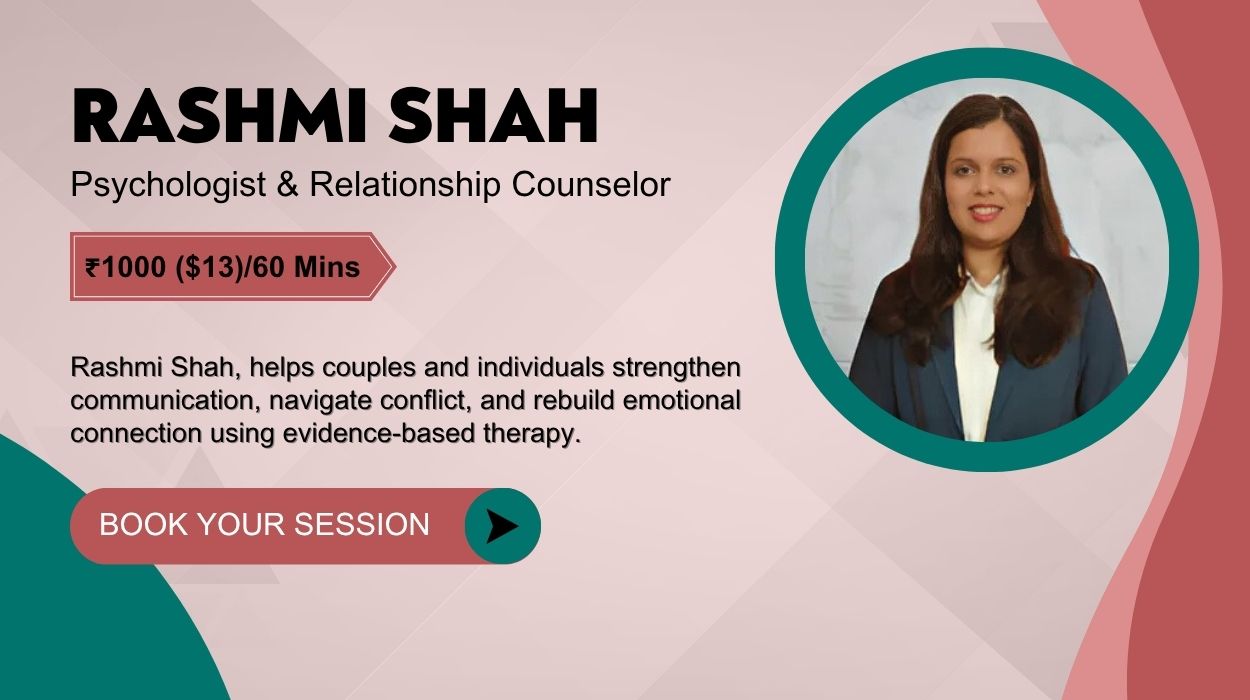
3. Spice up your sexual routine and pleasure
Our bodies change with menopause, which means the old ways of getting aroused or reaching orgasm might not work as reliably. You can circumvent it by exploring new ways and reinventing your sexual playbook. Here are some tips and techniques to consider:
- Use lubricants generously: If vaginal dryness or friction is an issue, which it is for many postmenopausal women, a good lubricant is a game-changer. Don’t think of lube as optional or “only if necessary”, make it a staple on your nightstand. Using lubricant liberally can reduce pain and increase pleasure, which in turn helps you relax and feel more desire
- Try vaginal moisturizers: Distinct from lubricants, which you use right before or during sex, vaginal moisturizers are products you apply regularly to keep vaginal tissue hydrated. Think of them as a moisturizer for your intimate area. They can improve overall comfort, reduce day-to-day dryness and itching, and make your vagina more supple for when you do have sex
- Prolong foreplay: As you age, arousal can take longer. What used to get you revved up in 2 minutes at twenty might now take 20 minutes at fifty. There’s nothing wrong with that; it just means don’t rush. Spend plenty of time on foreplay activities that you enjoy, whether it’s making out, full-body massage, manual stimulation, or oral sex. You might find that your desire is “responsive” rather than spontaneous. This means you don’t necessarily feel desire until things get going. Many menopausal women report that if they engage in intimate touch without initial desire, their body starts responding, and desire kicks in during the act. So, it’s okay if you’re not craving sex from the outset. You can decide to be intimate first, and let the feelings follow. “A lot of times, if you wait to have sex until you’re horny, you’ll never have sex, especially at this stage of life,” notes Dr. Mintz. “It’s like starting your car in the winter – you have to warm it up first.”
- Experiment with new forms of stimulation: If you’ve never used sex toys before, now might be a great time to try. Vibrators, in particular, can be incredibly helpful for menopausal women. Why? With age and lower estrogen, the blood flow and nerve sensitivity in the clitoral area can decrease, meaning you might need more intense or direct stimulation to feel the same level of arousal and orgasm as before. Vibrators provide consistent stimulation that can often bridge that gap. Other options to spice things up include trying a clitoral suction toy or exploring different sensual activities like mutual masturbation. Variety can create excitement. Importantly, trying new things might help you discover that while your body changed, it’s still very capable of great pleasure, you just needed to approach it differently
- Schedule intimacy: Spontaneity is overrated, especially in long-term relationships and busy midlife. One of the top recommendations from sex therapists for low libido is to actually plan “date nights” or schedule intimacy. This may sound un-sexy, but hear it out: when you schedule sex, you are making it a priority and giving yourselves mental space to prepare and get in the mood. This way, you avoid the classic scenario of always being “too tired” or never finding the right moment. Many couples find that once they get over the initial weirdness, scheduling sex actually builds anticipation and feels exciting
- Redefine sex and set realistic expectations: Finally, it may help to broaden your definition of what a sexual encounter looks like. Intercourse with simultaneous orgasm may have been the cultural ideal, but that’s often not realistic or even desired every time, especially after menopause. Every sexual encounter doesn’t have to end in orgasm to be fulfilling. You might decide that tonight’s goal is just enjoying touch and closeness, and that’s a win. When you take goal-pressure off the table, you often end up relaxing and enjoying it more, which ironically can lead to better orgasms
Related Reading: The Pressure To Perform, When Intimacy Becomes A Chore
4. Consider seeking medical intervention for low libido
Sometimes, despite all the lifestyle and emotional efforts, your body might need a little extra help from the medical toolbox. There is no shame in this. Menopause is fundamentally a medical/hormonal event, after all. Modern medicine offers several options that may improve libido or make sexual activity more comfortable. Here are some to discuss with your healthcare provider:
- Hormone Replacement Therapy (HRT): HRT usually means taking supplemental estrogen and sometimes progesterone, and can prove very effective for treating vaginal dryness and atrophy. It can be delivered systemically through pills and patches or locally via vaginal creams, tablets, rings. However, HRT isn’t right for everyone. Certain medical histories, like breast cancer, might preclude it. But if you’re a candidate, it could make a significant difference in how you feel. Bottom line: if your libido is really low and bothering you, ask your doctor about hormone options
- Treatment for vaginal dryness and pain: There are other medical treatments specifically for painful sex. One is DHEA vaginal inserts, a prescription suppository used nightly that converts into estrogen and androgen locally to improve vaginal tissue health. Another is Ospemifene, a daily oral pill that acts like estrogen in vaginal tissue to alleviate pain with intercourse. These options are often recommended if estrogen cream isn’t suitable or effective for you. On the non-hormonal front, there’s also laser therapy for vaginal rejuvenation. You can explore your options
- Take stock of existing medications: Review any medications you’re taking with your doctor to see if they could be contributing to low libido. Antidepressants, particularly SSRIs, are known for causing sexual side effects in many women. Likewise, blood pressure medications and even antihistamines can dry you out and decrease arousal. Don’t abruptly stop any medication on your own, but do have a conversation with your doctor about dosage adjustment or switching to an alternative that can improve your libido
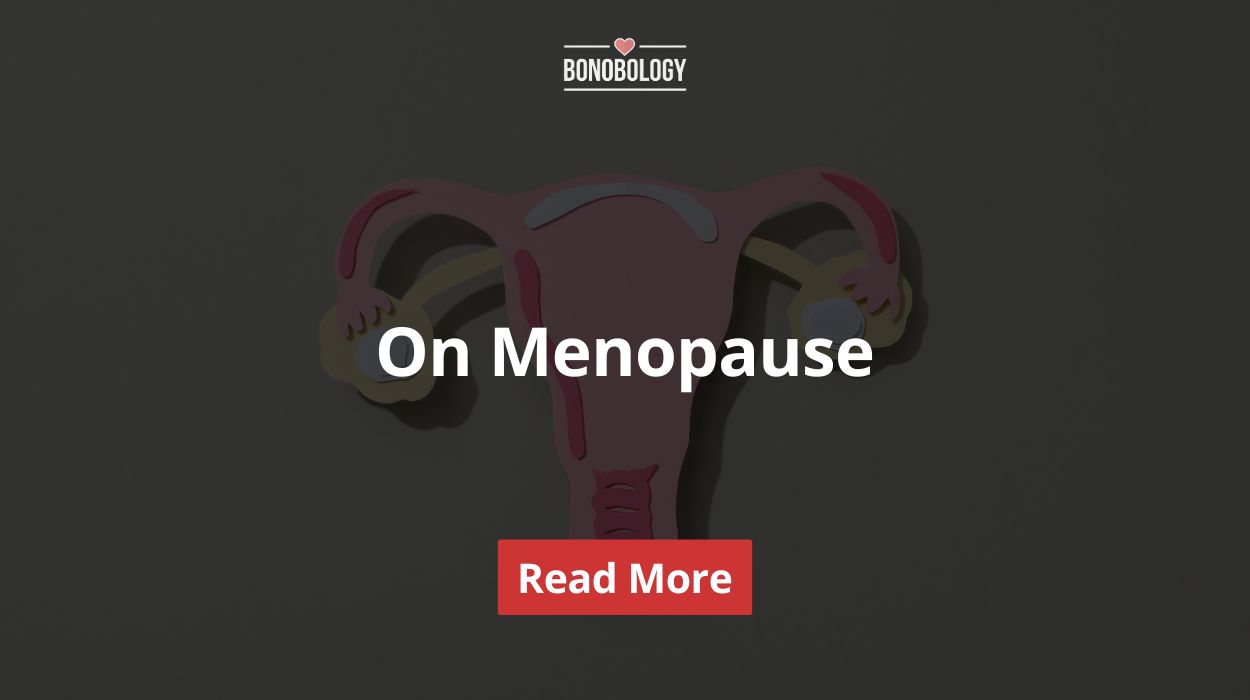
Recommended Products for Sexual Wellness and Libido
Lifestyle and medical interventions are considered the go-to options for managing menopausal libido loss. However, these aren’t the only options available to you. Sometimes, a few well-chosen products can make a world of difference in your comfort and confidence. Whether it’s easing painful symptoms or adding a spark to the bedroom, we’ve rounded up some high-value items that can support your journey.
1. Uberlube Silicone Lubricant
A top-rated, doctor-recommended lubricant for menopausal women. Uberlube is a premium silicone-based lube that is long-lasting, silky, and free of added fragrances or glycerin. It only has a few ingredients, including vitamin E, making it very gentle on sensitive tissues. Sexologist Dr. Shamyra Howard praises it as “one of the most body-friendly lubes on the market.”
If vaginal dryness or pain is an issue, this can be a bedroom game-changer. It reduces friction and stays slick without getting sticky. Many women also love that Uberlube leaves skin feeling moisturized, not tacky. It’s a bit pricier than drugstore lubes, but the quality and comfort are worth it, especially when you’re dealing with delicate menopausal skin.
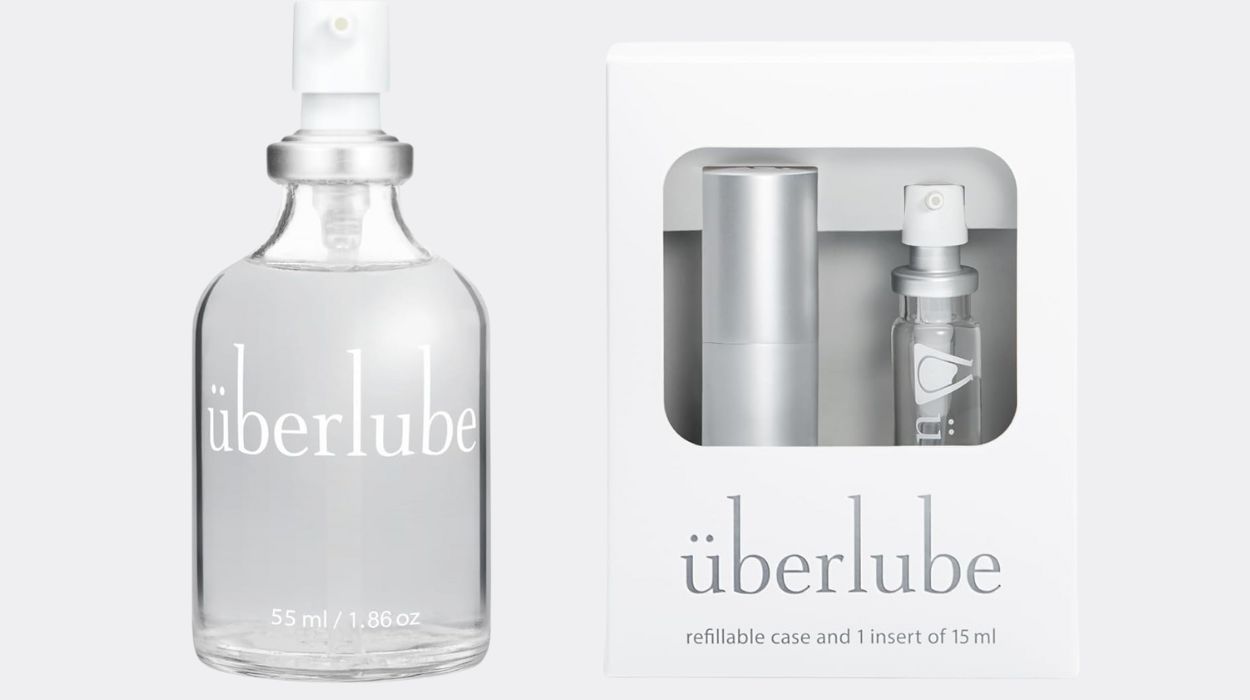
2. Replens Long-Lasting Vaginal Moisturizer
An effective daily moisturizer for dryness relief. Replens is an over-the-counter vaginal moisturizer that provides hydration to the vaginal walls and helps maintain a healthy pH. Applied every few days or as directed, it soaks into the tissue to alleviate that dry, sandpapery feeling many women get after menopause. Gynecologists often recommend Replens for women who can’t or prefer not to use estrogen.
Using Replens regularly can make sex more comfortable because your natural moisture is improved. Think of it as maintenance for your vaginal health. There are other similar products like hyaluronic acid gels, like Hyalo Gyn or Gennev Moisture Gel, which also work well, but Replens is widely available and backed by research for providing symptomatic relief.
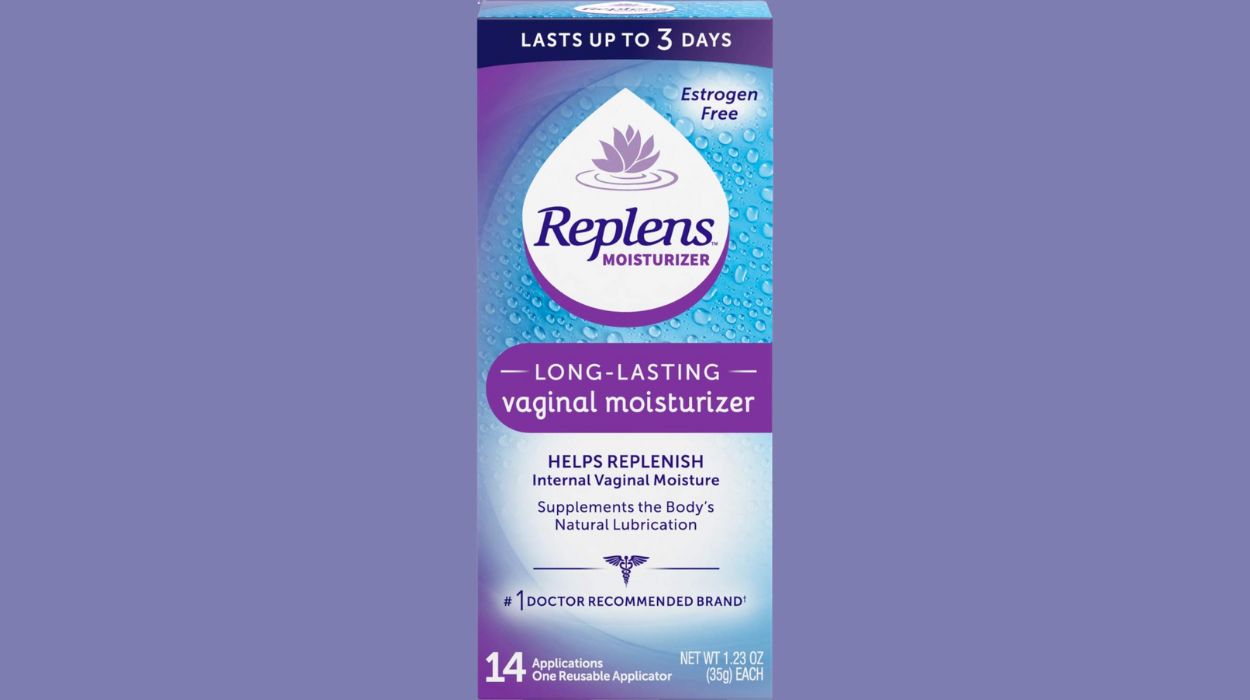
3. Maca Root Supplement
A natural herbal supplement that may boost libido and energy, Maca is a Peruvian root often touted for enhancing sexual desire and stamina. While not a guarantee, small studies have shown Maca root supplements can increase sexual desire in postmenopausal women compared to placebo. It’s thought to work by supporting adrenal function and hormone balance. If you’re interested in a holistic approach, a high-quality Maca supplement (look for “gelatinized” Maca, which is easier to digest) could be worth a try. Note: Always check with your doctor before starting supplements, especially if you have hormone-sensitive conditions

4. LELO Sona Cruise
A luxury sex toy designed for intense pleasure. The Lelo Sona Cruise is a high-end device that uses sonic wave technology to stimulate the entire clitoris (even the parts you don’t see) without direct contact. Why is this great for menopausal women? Because it can often produce deep, thrilling sensations even if your sensitivity isn’t what it used to be. Essentially, it’s an upgrade for your orgasms. The Sona has multiple intensity settings and a soft silicone exterior. It’s waterproof (hello, bath time fun) and USB rechargeable.
It’s built to last and many women swear it’s worth every penny for the new kind of orgasm it provides. If you’ve found that regular vibrators aren’t quite doing the trick anymore, a clitoral pulsator like this could be a game changer. Plus, using a toy solo or with a partner can help “exercise” your arousal response.
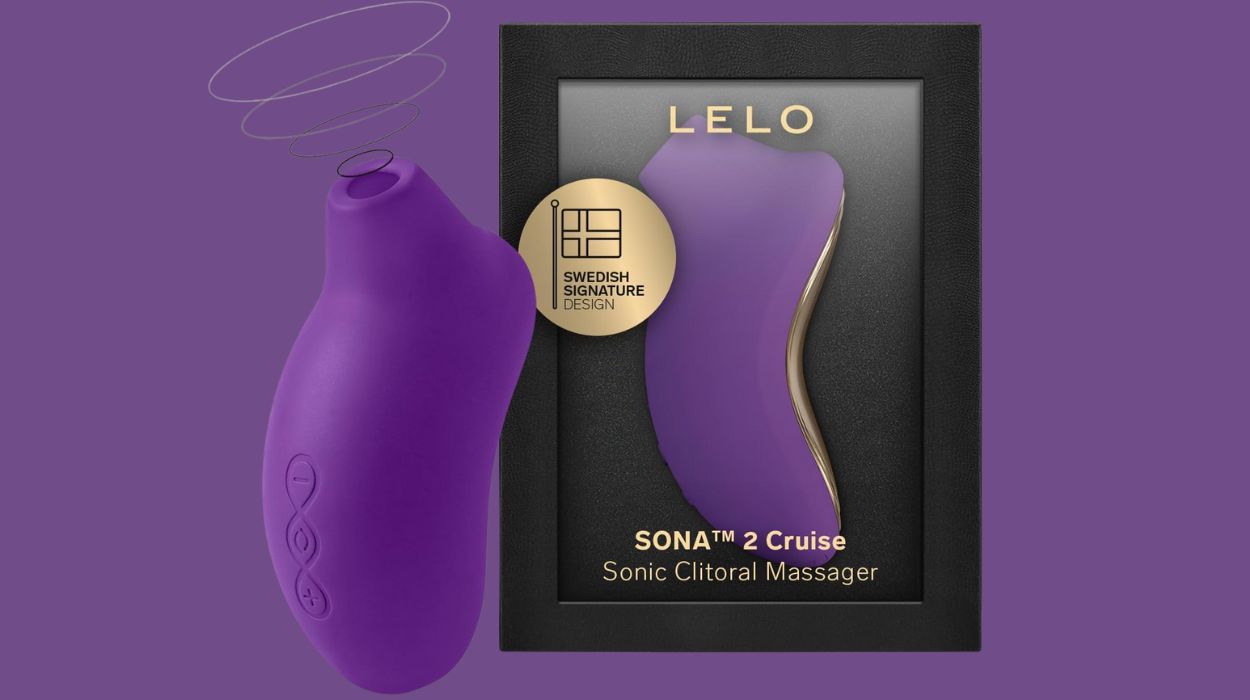
5. We-Vibe Sync Couples Vibrator
The We-Vibe Sync is a popular wearable vibrator that is designed for couples to use during intercourse. One part inserts vaginally and presses against the G-spot, while the other part nestles externally on the clitoris. It’s hands-free and stays in place during penetration. The result is that both partners can feel the vibrations, and many couples find it helps the woman reach orgasm more easily during sex. It comes with a remote control and a phone app to change patterns and intensity.
Using a couples vibrator can be a fun way to bring something novel into the bedroom and ensure that you’re getting the stimulation you need. If your partner is game, this can be a great addition to your intimate routine, adding excitement and boosting your odds of pleasure, which, again, feeds back into desire positively.
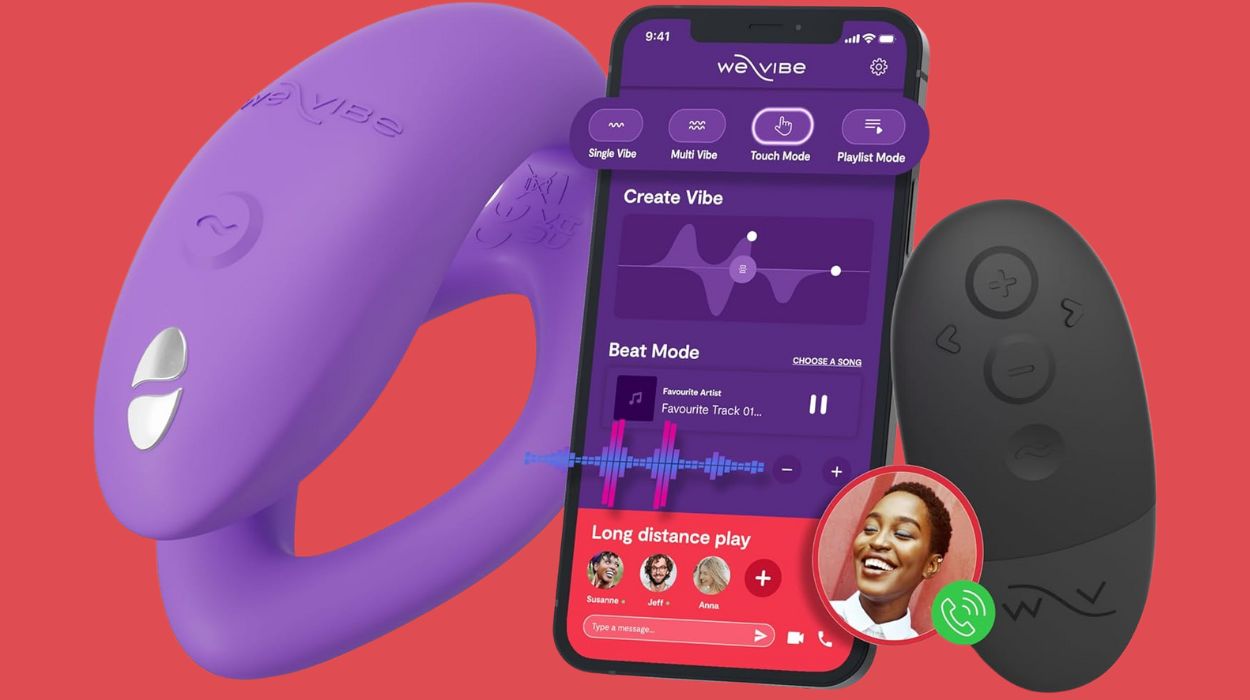
6. Bonus—intimate aids
Okay, that was more than a few products, but here’s a quick roundup of some intimate aids you can explore:
- You might also consider things like arousal gels or oils. For example, a few drops of a product like Zestra or “ON for Her” oil applied to the clitoris can create a warming, tingling sensation that some women find helpful to jumpstart arousal
- Another aid is pelvic floor exercise devices like Care+ Kegel Trainer or yoni eggs. Stronger pelvic muscles can increase blood flow and sensation, potentially enhancing orgasm
While these aren’t libido boosters per se, they can improve your sexual response which can encourage your libido to perk up over time.
Consider your specific needs and challenges, and you’ll find there’s a product out there targeted to help. The sexual wellness market has expanded greatly for midlife women, so whether it’s sexy lubricants, erotic literature apps for mental stimulation, or massage candles to set the mood, don’t be afraid to explore! Sometimes a small addition or change, even something as simple as new lingerie that makes you feel beautiful, can spark a positive change in your sexual well-being.
Key Pointers
- Libido loss during and after menopause is driven by a mix of biological factors like hormonal changes, vaginal dryness, and other physical health issues
- Psychological stress, body image struggles, and relationship dynamics also play a major role in lowering sexual desire during this phase
- Menopause-related libido loss can strain emotional intimacy and communication in relationships, leading to misunderstandings, guilt, and a decline in self-esteem for both partners
- Managing this phase effectively involves prioritizing physical and mental well-being, improving communication, redefining intimacy, and considering medical support when needed
Final Thoughts
In closing, navigating menopause and libido loss is truly a journey. There may be some trial and error as you find what strategies or products make the difference for you. Be patient with yourself and with your body. Desire can be a subtle thing. It might ebb and flow, but with attention and care, it can absolutely be revived or reimagined in this new stage of life. As Dr. Mintz said, menopause is not the end of your sex life; in fact, it might be the beginning of a more mature, liberated, and exploratory chapter of sexuality for you. Whether it’s through nurturing your health, strengthening emotional bonds, trying new turn-ons, or utilizing a bit of medical help, you have many tools at your disposal.
Most importantly, remember that you deserve pleasure and intimacy if you want it. There is no “normal” amount of sex drive – only what’s normal for you, and what makes you happy. If a loss of libido is troubling, hopefully this guide has shown you that there’s hope and plenty of options to reclaim a satisfying sex life. And if you’re someone who finds you’re okay with less sex but still want closeness, that’s valid too – intimacy comes in many forms. Love and connection in midlife can be just as rich, with or without a raging libido.
Here’s to embracing the changes with knowledge, creativity, and self-compassion. You are not alone on this ride – and perhaps, with the right support, you’ll find that your sexual flame can burn in a new way, brighter than you expected, even after menopause.
Your contribution does not constitute a charitable donation. It will allow Bonobology to continue bringing you new and up-to-date information in our pursuit of helping anyone in the world to learn how to do anything.

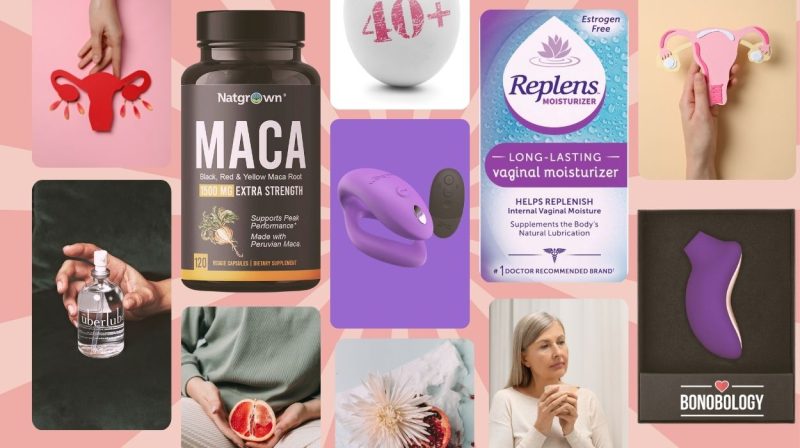
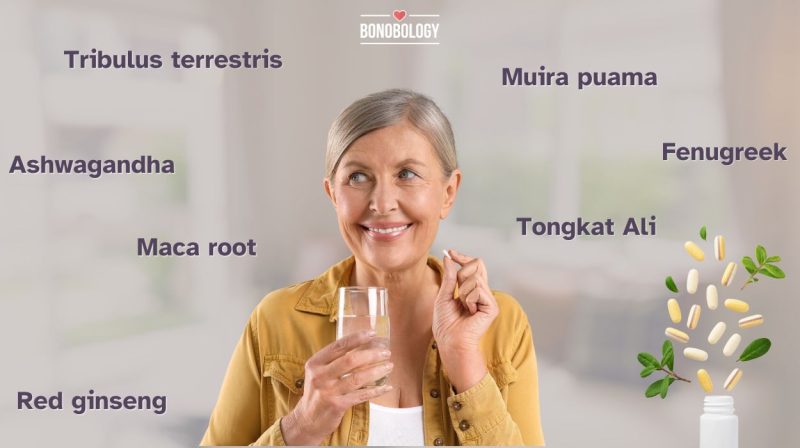

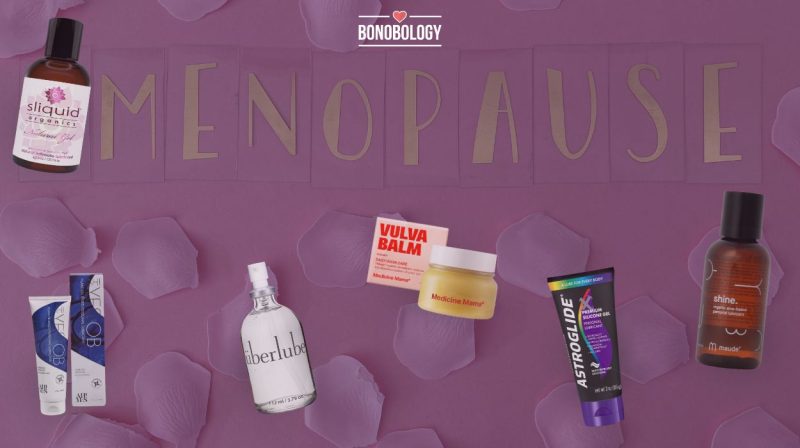
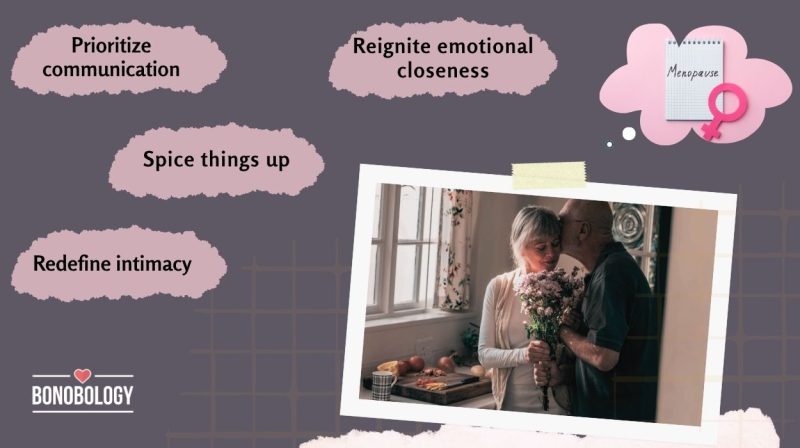
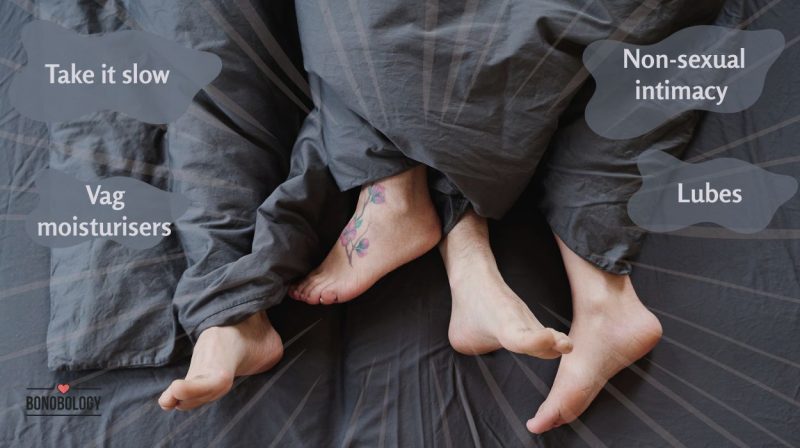
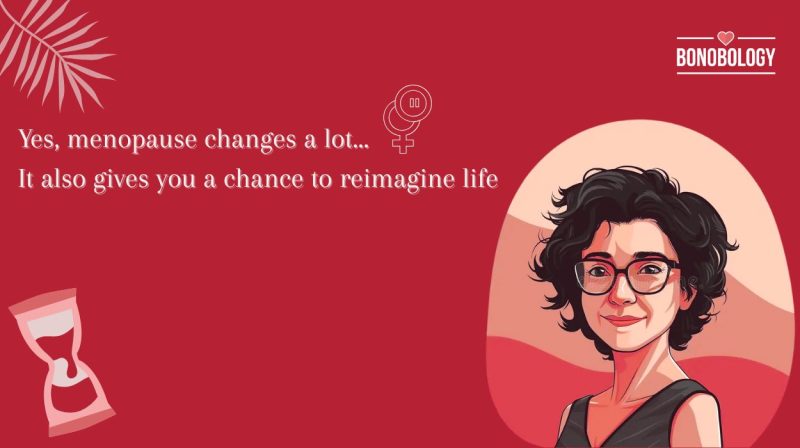
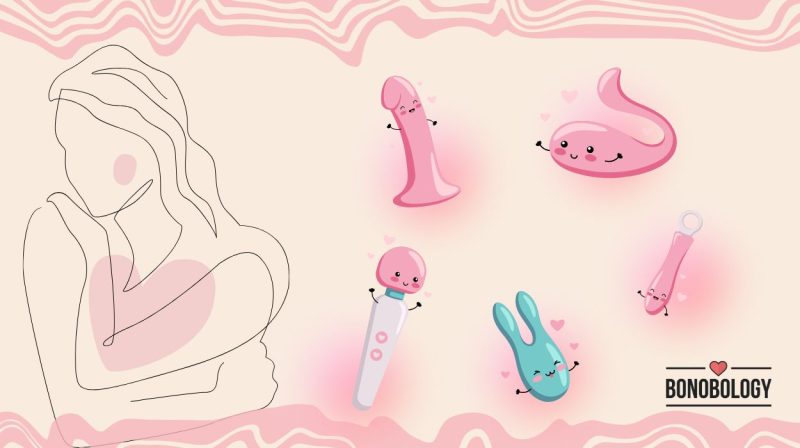
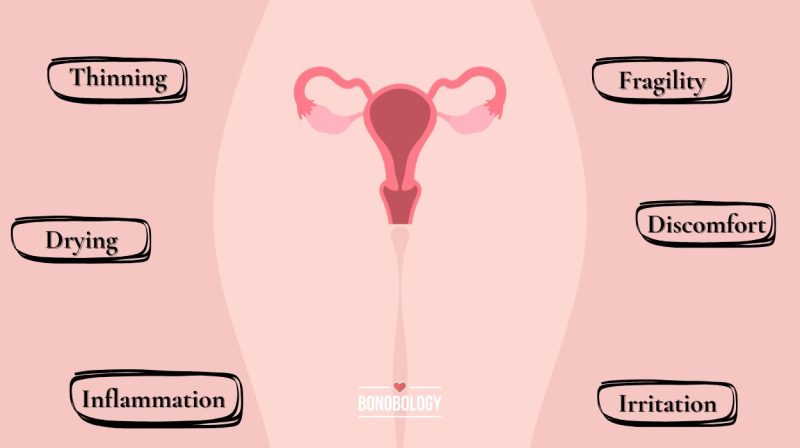

Featured
11 Best Supplements for Women’s Libido After Menopause
15 Spectacular Options For Lingerie For Older Women—Classy Yet Sexy
15 Best Lubricants For Menopause Dryness
How To Bring Back Intimacy In A Marriage After Menopause—9 Tips
Painful Sex After Menopause? Try These 9 Time-Tested Solutions
What After Menopause: Understanding How Your Body Changes
10 Best Vibrators for Women Over 50, Rated By Real Women
Vaginal Atrophy Menopause And Its Toll On Intimate Relationships
How To Increase Libido After Menopause—9 Easy Ways